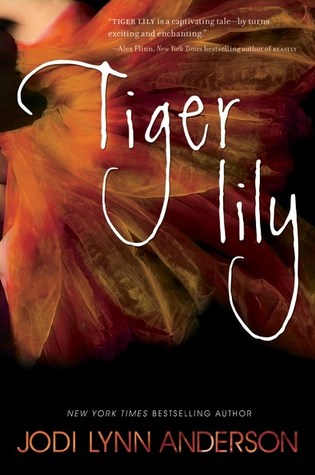
Tiger Lily
by Jodi Lynn Anderson
My rating: ⭐⭐⭐⭐☆
Goodreads Link: https://www.goodreads.com/book/show/12924326-tiger-lily
Recommended
to me by: a few book bloggers and one of my 10th-grade English students,
Lorilei, from 2013-2014
Recommended
for: Teens and lost souls
Read
from November 12 to 18, 2014 — I own a copy
Tiger Lily by Jodi Lynn Anderson was an interesting retelling of J.M. Barrie's Peter Pan. (Click here to find my review of Peter Pan)
On
the one hand, I love how she sewed Tiger Lily's story so tightly into the
original tale: how she includes Tiger Lily's capture, and the Neverbird nest
rescue, and the pirate's attack on the burrow. And I love how she told some of
the back story to certain parts of the source material: how the Neverbird nest
got to the rock, why the crocodile ticks, and what happens to Peter in the end.
But
on the other hand, to weave a new, complete story into an already-complete
story sometimes means that one cannot fit it all in comfortably, and there were
a number of parts that felt rushed and/or unexplained. The Englander subplot
and its effects on Tik Tok was a lot to take in, and made it difficult to stay
focused on Tiger Lily, Tink, Wendy, and Peter. Then there was the new subplot
of Smee that creeped the crap out me, and felt a bit forced and underdeveloped
- I could never really get a clear grasp on what motivated Smee's obsession
with Tiger Lily. And these new developments with Smee were so counterintuitive
and uncharacteristic of the Smee I already knew (from all of the versions:
Barrie, Disney, and the movie, Hook), that it was too much change for me to
wrap my brain around. It ran so much against my own mental grain that I
couldn't believe that it could be possible. And Anderson made a few other
changes, too, that disturbed my understanding of the Neverland world so much as
to feel impossible. Readers, especially those already enamored with a source
text, will never be able to deviate too far away from what they love. So when
Anderson changed Smee, or changed Hook's motivation for wanting to capture
Peter, or changed the Lost Boys' ability to fly, it was just overwhelmingly
unbelievable to the point where my brain fought back against the very
suggestion of these non-linear changes.
Also,
the ending, while poignant, was so lackluster. They all settled in the end. It
kills the very hope that Barrie was so desperately trying to create! In our own
real lives, we always have to settle; we always have to give up our childhood
fantasies in order to accept our adulthood realities. In Peter Pan, Barrie was
trying to create a place where even adults could hold fast to those
long-forgotten childhood dreams forever, an escape that we, adults, could hope
and dream for, even when we were shackled down to our unfortunate monotony. But
Anderson breaks this hope! Tiger Lily, Peter, Tink, they all settle in the end,
thereby killing the escape. Neverland is supposed to be about staying innocent
forever, and this story is about losing innocence: that was difficult for me to
accept.
I
did love Anderson's ultimate lesson, though: Love, in all its many forms, marks
us - equivalent to rings in a tree trunk or waterlines on a tide marker.
Anderson writes, "Peter walked across her heart, and left his footprints
there" (290), which is a perfect analogy that also nods to the scene in
the movie version when Tink leaves little ink-stained footprints on Hook's map.
And I love the ultimate moral: we must learn to find those people who love us
exactly as we are (288). Tiger Lily had that kind of love from Tik Tok, Pine
Sap, and Tink, but she didn't recognize it as enough because Peter's footprints
were all over her heart. Sometimes we have to learn to accept the love we
deserve (a nod to The Perks of Being a Wallflower) and the love that others are
willing to give. Tik Tok, Pine Sap, and Tink loved Tiger Lily unconditionally,
without fear or question. And I liked that lesson a lot, especially in a YA
book. Teens need to hear that - accept the love that accepts you for who you
are and doesn't ask anything else from you. So many teens are constantly trying
to fit themselves into the box they think others want for them; eventually,
they will find, years later, that the box caused such deformation that they
lost their own unique shape along the way. This book tries to show the reader
this lesson. And for this lesson, this was a very powerful book, indeed.
Overall,
forgiving a few missteps or wobbles along the way, Anderson did a wonderful job
of creating an understory for Tiger Lily that floats, for the most part, just
below the surface of Barrie's canonical work. And while there were parts that
felt superfluous or forced, I appreciate that Anderson went for it all the way,
creating an entire world outside of just Peter's. I highly recommend this book,
especially to teens who struggle with finding and owning their own identity.
Tiger Lily's example of looking for a love that fit her own mold is a powerful
lesson that more teens need to read.

